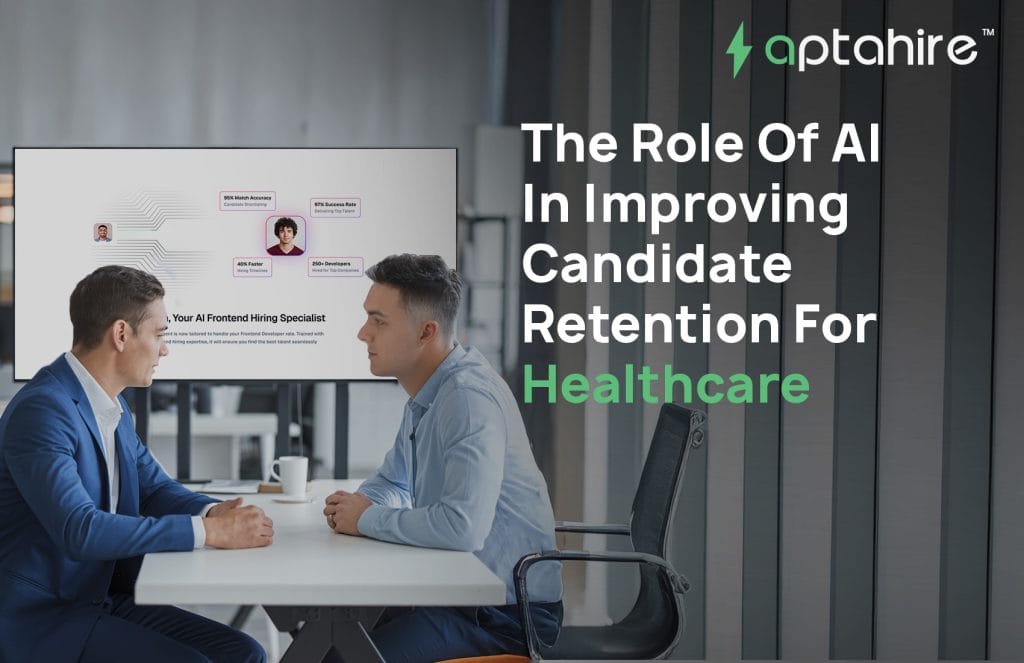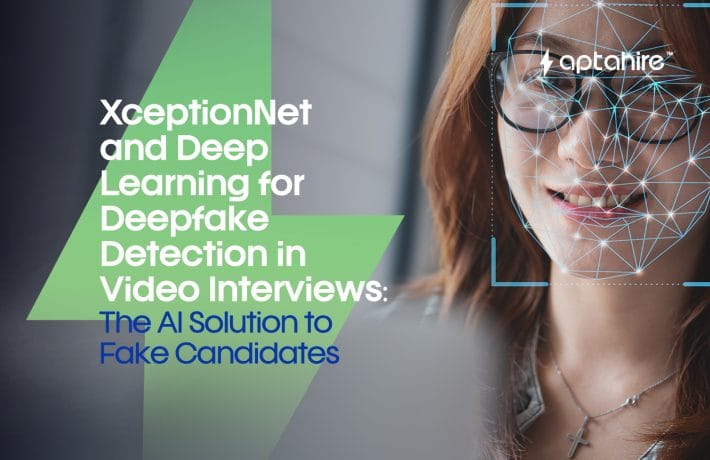The Role of AI in Improving Candidate Retention for Healthcare

The healthcare industry is vital to society. It faces a tough challenge: hiring, retaining, and finding good talent. As hospitals and clinics expand to meet demand, workforce challenges are becoming a growing epidemic. A global shortage of healthcare workers and rising burnout make it vital to retain skilled employees. It’s no longer optional; it’s a must. Most of the people are either switching organizations or facing burnouts. Which calls for the need of HR automation in healthcare. There’s an abundant need for incorporating candidate retention strategies.
The stakes for healthcare organizations are incredibly high. High turnover raises recruitment costs, frustrates patients, and strains overworked staff. Add the job’s psychological cost: burnout and emotional fatigue. It’s clear that candidate retention strategies must rise to the top. This blog will discuss healthcare recruitment challenges, covering how AI can help and ways to improve retention.
The Need of Candidate Retention Strategies
Candidate retention strategies play an important role in keeping healthcare professionals skilled. Good retention comes from a strong onboarding process, growth, and flexible work. This is where HR automation helps. It smooths unnecessary tasks, reduces errors, and improves hiring and retention. AI tools can predict employee attrition and satisfaction trends. They can also personalize growth opportunities for each candidate. HR automation and structured candidate retention strategies can help healthcare organizations keep their staff. These tools create a positive work environment that reduces burnout.
Pain Points and Issues in Healthcare Recruitment
Thus, it is a complex situation to hire and retain staff in healthcare organizations. Some of the key pain points include:
1. Urgent Need for Qualified Healthcare Professionals
They do not have enough professionals for the healthcare system. And then there’s the scramble to fill vital roles. On certain subsets, such as critical care, surgery, and radiology, the stakes are high. And in these same fields, a lack of staff can be the difference between life and death for patients. Still, there is even more sense of urgency. However, when such critical positions have vacancies, staff workloads are increased, and stress is put on existing staff. Poor patient care and lack of staff leave them in the position to potentially increase the risk of healthcare due to delayed treatments, too.
2. Scheduling Conflicts with Hiring Managers
Recruiting is an inherently fast-paced area of work, so, unsurprisingly, hiring managers do not have time for recruitment tasks. Scheduling interviews and contacting candidates becomes a nightmare if it is not solved. It delays hiring. Filling vital positions is hard with these delays. If they’re lucky, they’ll lose some qualified candidates to companies that hire faster. These tides roll through inefficiency rife; then they swell overloaded workforces and operational gaps.
3. The Meeting Compliance Requirements for Healthcare.
When you work in the healthcare industry, by definition, you will have specific strict regulatory and compliance requirements when applying for a position. That can extend to background checks, credentials and, verifications, and so on. It’s time-consuming and full of mistakes to hire people manually. Compliance can seriously damage an organization’s reputation and lead to legal liabilities. This added complexity puts pressure on HR teams. They’re dealing with high turnover and record vacancy rates already.
Tactical Problems in Healthcare Recruitment
1. High Volume management of Applications for Specialized Users
In healthcare, there are even some specialized jobs that have a flood of applications. Recruiting slows down when you’re sorting through this application by hand. In the worst case, it may make us miss good candidates. That’s harder for an organization that has an antiquated applicant tracking system (ATS). As a result, those ATS also don’t have the sophistication for nuanced sorting and filtering.
2. Rapid Credential Verification
Even healthcare recruitment takes time, if not laborious. This delay can be devastating in terms of killing your hiring timeline. It affects unfilled, critical roles. An example is that licenses, certifications, or work histories have to be verified in a time-sensitive way. The coordination has to be done with hundreds of organizations and databases, so it’s very complex.
3. Coordinating Multiple Hiring Rounds Efficiently
In healthcare, this usually involves multiple rounds of interviews, tests, and reference checks. Recruitment coordination often breaks down in this process, which involves candidates, hiring managers, and HR teams. In addition, there are inefficiencies and longer timelines.
Root Causes of Recruitment Challenges
1. Outdated Processes Holding Back Progress
Traditional, manual approaches are one of the biggest barriers we face in healthcare hiring. These are the processes that consume valuable time and resources –for sorting through resumes, verifying certifications, and more. Unfortunately, they also have room for error, biased behavior, and oversight. When speed and precision are integral to an industry, organizations relying on outdated methods risk losing exactly the talent they want to keep. This means that it creates inefficiency, which often leads to delays and challenges in meeting staffing requirements on time, thus frustrating the candidates and the HR team.
2. The Demand for Healthcare Roles is Outpacing Supply.
As is well known, there is a lack of sufficient healthcare professionals. From specialty to specialty, there has been a sharp increase in demand for nurses, physicians, and technical staff, and supply has not been able to keep up. But all these developments lead to a mismatch, resulting in an insanely competitive hiring world, where organizations are often overly eager to grab talent without complete evaluation of long-term fit. To compound the issue, fast hiring simply sets someone up for failure, and if it’s not the right person, the attrition rates can really be high because you are mismatched, and you’re getting rid of people because they can’t keep up.
3. A Workforce Facing Burnout
High-stress environments not only damage the physical health of healthcare professionals; they also hack away at their mental health. The industry has pervasive burnout, fatigue, and emotional exhaustion, and we need to address those issues as part of the hiring process. With no tools to test mental resilience and workplace compatibility, organizations can hire people who may not do well in high-stress jobs without adding another source of frustration at the threat of turnover.
Aptahire Can Change Healthcare Recruitment
Such complex challenges make Aptahire a shining light in healthcare organizations. AptaHire utilizes the latest advancements in AI technology to streamline recruitment processes, solve their source, and realize talent retention’s true potential.
1. Smarter Candidate Screening
Aptahire offers no chance for guesswork in talent acquisition because of its AI-driven platform. It quickly isolates top candidates based on qualifications, experience, and certifications and can easily parse resumes to get info on the candidates, etc. This means that instead of hours of sifting through applications, HR teams can trust Aptahire to instantly shortlist the most relevant candidate and save precious time and effort.
2. Compliance Made Easy
Healthcare hiring is a critical yet daunting task, and meeting regulatory requirements is a must. Aptahire works with credentialing systems to easily set every hire for compliance. Whether verifying licenses or checking references, the platform automates these steps, giving companies peace of mind and letting them focus on other priorities.
3. Efficient Interview Scheduling
There are just no two ways around it. Time is a precious commodity in healthcare recruitment, and due to conflicting schedules, there shouldn’t be any unnecessary delays. With Aptahire’s intelligent scheduling tool, these bottlenecks disappear when candidate availability is aligned with a hiring manager’s schedule. The benefit of this streamlined process is that interviews are scheduled quickly, which helps to keep hiring timelines on track and improves the overall candidate experience.
Other Advantages That Separate Aptahire
Real-Time Candidate Engagement: With Aptahire AI chatbots, candidates are never left in the dark. They call email, provide updates, answer inquiries, and lead applicants from start to finish in the recruitment process.
Predictive Hiring Insights: Traditional recruitment is taken to the next level when we use predictive analytics to assess candidate compatibility. This guarantees a better fit to the role and to the organization, thereby reducing turnover and increasing job satisfaction.
Mental Health Compatibility: Aptahire acknowledges the mental requirements of healthcare roles and uses assessments to examine how a candidate copes with stress and is resilient. This feature allows organizations to base hiring decisions on the long tail.
Using these innovative tools, Aptahire enables healthcare organizations to become more resilient by creating a more robust workforce that benefits both patients and professionals. To learn how their solutions can make a remarkable difference in your recruitment process, visit aptahire.ai.
Conclusion
Healthcare organizations must retain their skilled, dedicated workers. They need effective candidate retention strategies to do this. HR automation can help healthcare recruiters. It can cut hiring costs, reduce their workload, and improve the candidate experience. AI insights help HR teams find and fix potential employee attrition risks. A good healthcare recruitment strategy is vital. It boosts workforce stability and improves patient care. It reduces staff shortages and burnout.
In dire need of hope where there’s employee scarce, its exactly where ai interviewing tools like apthire could come in! Employing our AI interviewing tool would help to ensure upbeat candidate retention strategies and promotes HR automation. Reach out to us!



